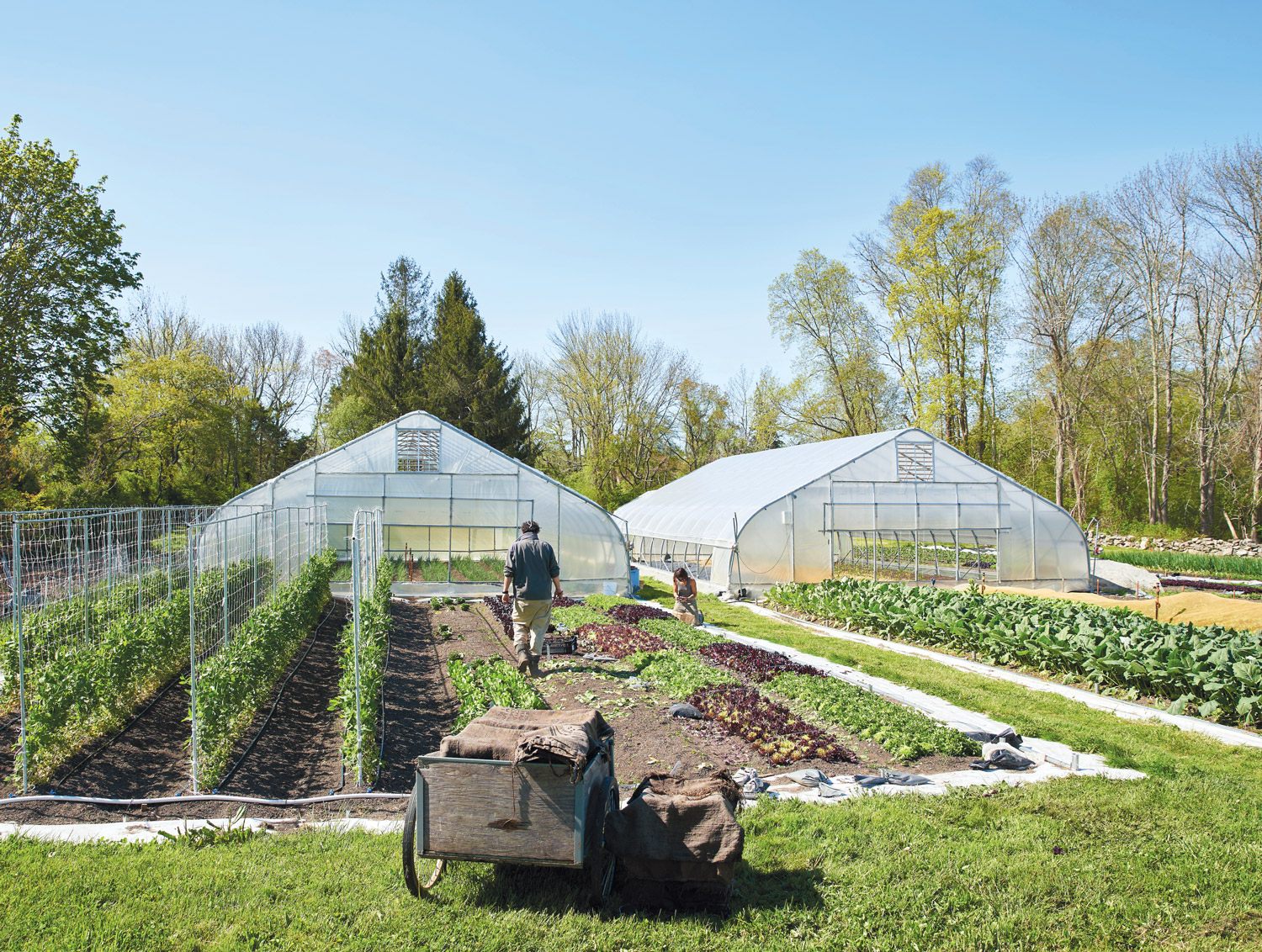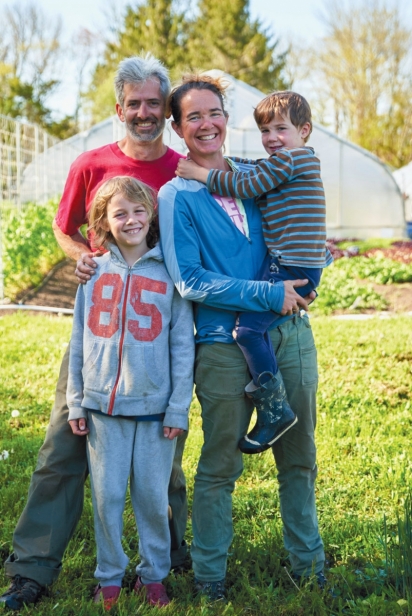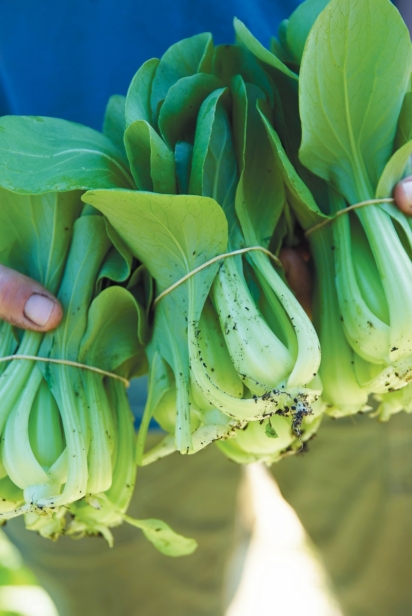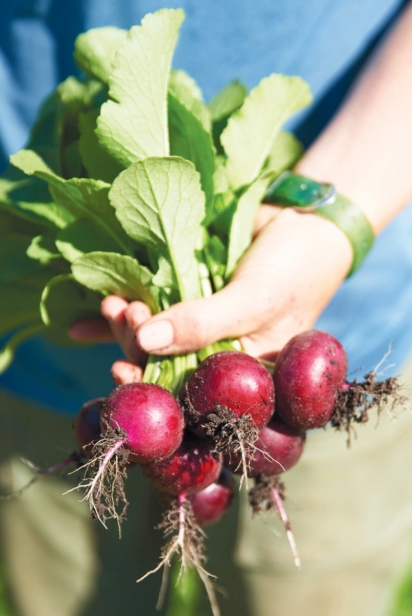Roots Farm in Tiverton
High-Yield Farming on a Small Footprint: an Answer to the High Cost of Farmland in Rhode Island
Last year, Kelli and Mike Roberts of Roots Farm harvested 24 tons of produce, seven tons of which were greens. All of these crops were grown on their relatively small farm in Tiverton, which sits on just one-and-a-half acres.
“We manage things on a much tighter bed-by-bed system,” Kelli said. “We like this scale—it allows for more [crop] diversity.”
The Roberts farm uses a no-till method of “market-garden-style farming,” which allows for high yield within a small space. The reasons for a no-till approach are to preserve soil quality and natural biology, and also to increase plant health.
Kelli grew up in Tiverton and, when she left for college to study engineering, did not expect to return—especially not as a farmer. In college, she met Mike, who was also studying engineering. Mike was born in Argentina and lived there until he was 9, and then moved with his family to Massachusetts. Together, they moved from Boston, to Seattle, to Maine and then Ithaca, New York, along the way taking breaks in their studies to work on farms. Slowly, the call to be outdoors planting crops and tending to harvests began to feel more natural for them both than working as engineers.
The Robertses were very much influenced by Eliot Coleman of Four Season Farm in Harborside, Maine, who practices market-garden- style farming and with whom Kelli spent a season apprenticing. Coleman is the author of The New Organic Grower, Four Season Harvest and The Winter Harvest Handbook.
In 2009, the Robertses purchased a small plot of land in Tiverton and began Roots Farm, which is now in its 12th year. Before this, they leased land for a year in Bristol. Kelli noted their first season was winter, which is appropriate as the farm is a four-season farm, and growing and harvesting year-round very much influences their approach to farming. By 2014, both Kelli and Mike were working at the farm full time.
All of the crops at Roots Farm are planted in slightly raised beds, arranged in rows and separated by a well-worn footpath, which helps with drainage and prevents erosion. These beds are rotated two to four times a year, depending on the crop. This rotation cycle allows for a lot of succession within the same area, which Kelli notes helps with soil health. With each planting, compost and organic amendments are integrated in the soil, which aid nutrient density.
The Robertses utilize a moveable greenhouse system that functions on rails and can be moved into three positions depending on the season. Altogether, they have six greenhouses, all movable.
“We do this fun little dance with the seasons, moving them three times a year,” Kelli said. The crops currently approaching harvest inside the greenhouses include radishes, bok choy, salad turnips, the first spring carrots, chard, big bunches of kale, beets and “fresh onions that we over-wintered,” Kelli said, adding that late spring will see the arrival of sugar snap peas and cucumbers.
Generally, the crops planted for summer will stay in the greenhouse from May to October. Then, after the first frost, the greenhouse is moved into its winter position, where it stays until around mid-March. In March, the greenhouse moves into the spring position, where it stays until May and the cycle begins again. The greenhouses are not heated and are very well ventilated, Kelli said, noting they keep deer out.
“We like this scale and style because it’s what interests us,” she said, adding that it’s “a viable way to farm in a place with high land costs, like Rhode Island.”
When she and Mike were deciding where to establish their own farm, they considered Maine, but felt that region was saturated with organic farms and were worried about competing with other farmers. Tiverton, though, had some appeal, both because Kelli is from there, and also because Rhode Island at the time had fewer organic farms and more of a need for small-scale farming.
“We were really ready to put down our roots,” she said, which had some influence on their choice of name: Roots Farm. “Being from Rhode Island also made it feel more like home,” she added. The couple now raise their two children, ages 9 and 6, at the farm.
Roots Farm has a full-time staff of five who work year-round, plus Kelli and Mike. “We’re trying to offer a living wage and as many benefits as we can,” Kelli said, noting that burnout, especially in late August, is common among farmworkers. She and Mike are doing their best to support staff so that doesn’t happen at Roots Farm.
During the pandemic, the Robertses launched an online store, which they’ve continued. They also have a flexible farm share, with about 160 members for both the summer and winter seasons. Half their sales take place at farmers markets, which include the Aquidneck Growers summer and winter markets in Newport, and the Mount Hope Farm year-round market in Bristol.
As for the farm scene in Rhode Island, Kelli has watched it evolve in positive ways over the past 12 years. “Support for local farms is growing and staying, which is really encouraging,” she said.
For more information about Roots Farm and its offerings, visit RootsFamilyFarm.org.








